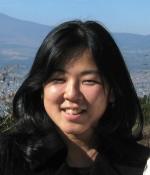 Yoko Hisano, originally from Japan, now works in the field of international education in the USA. She writes about what she learned through the Life Matters course and how it has affected the way she lives now.
Yoko Hisano, originally from Japan, now works in the field of international education in the USA. She writes about what she learned through the Life Matters course and how it has affected the way she lives now.
When I was in college, I found out about IofC Japan. I took part in several youth gatherings, conferences, and leadership trainings and met many amazing people from all over the world who came together because they all shared a common goal: a hope, a wish, a conviction to make this world a more peaceful place. This has been my experience, indeed. I went to gatherings to spend time with these people. But there was even more significance than that.
You might wonder, what’s more than people?
Well, it was the space that allowed us to be self-reflective and to share the awareness that creating world peace starts from changing ourselves. Perhaps "changing ourselves" is a loaded phrase. I see it more as a process of dealing with my worries, concerns, fear, and frustrations—those negative emotions that affect my views and interaction with others.
How I came to this awareness is through "Quiet Time" that was a part of any workshop, session, or gathering. This was a time to reflect on oneself or on a specific topic. I first discovered this practice of "Quiet Time" every morning, and sharing it with a group of people when I participated in the IofC Life Matters Course in Australia, in 2001. The friends I met there encouraged me to challenge myself, to look deeper at myself to find tendencies and patterns of life that negatively affect me and my surroundings.
What was life-changing about this experience is that it helped me to see who I really was. I felt like I was truly connecting with my authentic self without judging myself. Since then, in the effort to stay connected with this authentic self, the "Quiet Time" became something that I include in my everyday life. It’s not an exaggeration to say that this approach has been a framework for my life. On a practical level, through trial and error, I have learned to be flexible with how long I take "Quiet Time" in order to do this every day. So sometimes it’s just three minutes, sometimes an hour. It simply depends on my schedule.
Through this self-reflective practice, I have been able to explore my passion and find my calling. For me, it is to build bridges with people, to inspire people to see different worldviews, and to heal people. I have realized that it's the work with people, for people, that makes me excited and happy.
Fast forwarding to where I am now: It has already been a little over a decade since I first learned about IofC in Japan. In 2004, I went to Vermont for graduate school and in 2008, I moved to Durham, North Carolina, for a job. Currently, I work at Duke University in an office that supports international students and scholars. This profession, International Education, is in fact the exact thing that I feel I am meant to do: connecting people from all over the world and working with people (both Americans and internationals) to help them understand different worldviews through intercultural communication trainings. When I facilitate workshops and leadership training programs, I include reflective activities to create a space and time for participants to connect with their authentic selves. I believe this is what it means to pass on what I have learned through attending IofC activities. I feel like I am planting small seeds of peace through my work.
However, it does not mean that I am perfect. I am constantly reminded of my assumptions that are rooted from seeing the world through a lens colored by Japanese values and social norms. Sometimes I catch myself interacting with a student from another culture, thinking, "This student is so rude! He didn’t do this and that and I’m much older than he is." I’ve realized that the voice in my head is judgmental. The student didn’t respond in a way that I thought was polite from my Japanese point of view. As a matter of fact, the student might have been polite according to his own cultural values. By assuming things, I only create unnecessary conflicts in my head and negative emotions that accompany it. One night, during my "Quiet Time," I realized this.
Every incident like this pushes me to work harder to change myself. Change to be non-judgmental, to not assume, to be less fearful of the unknown, and to be a change-maker. Thus, the quote by Mahatma Gandhi, "You must be the change you wish to see in the world," has also been my motto.
In writing this article, I have come to realize that I am actively involved in IofC just by using the IofC approach in my work and my life. I am living in the spirit of IofC values. I try to practice what I believe and give back to the world through my work of International Education. My encounter with IofC has definitely helped me find my true path and I am grateful for that.

